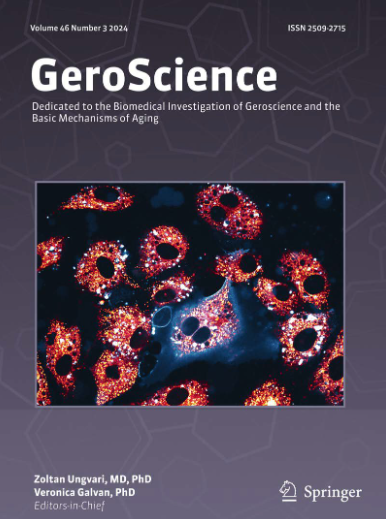空气污染与衰老中的冲动选择:来自延迟贴现的证据。
IF 5.4
2区 医学
Q1 GERIATRICS & GERONTOLOGY
引用次数: 0
摘要
空气污染的加剧与患阿尔茨海默病和帕金森病等神经退行性疾病的风险增加有关,但目前尚不清楚污染如何更广泛地影响衰老的大脑。啮齿动物研究表明,较高的空气污染暴露与冲动行为增加有关,在延迟折扣任务中,冲动行为表现为对即时奖励的偏好。我们通过分析住宅污染暴露与基于时间的奖励偏好之间的关系,在中年和老年人中检验了这种关系。103名年龄在40-80岁之间的成年人完成了延迟折扣任务。我们使用参与者地址信息和卫星污染数据估计了长期居住暴露于细颗粒物(PM2.5)的情况。细颗粒物是一种突出的空气污染物。我们发现,即使在控制了包括收入和教育在内的人口因素之后,较高的住宅PM2.5暴露水平与对更直接奖励的更高偏好显著相关。对即时奖励的偏好与成瘾行为(包括药物滥用和赌博障碍)的高风险独立相关,这表明PM2.5暴露可能会增加这些疾病的出现。我们将详细讨论这些结果以及潜在的生物学机制、对人类行为的影响以及未来的研究方向。本文章由计算机程序翻译,如有差异,请以英文原文为准。
Air pollution and impulsive choice in aging: evidence from delay discounting.
Heightened air pollution exposure is associated with an increased risk for developing neurodegenerative disorders such as Alzheimer's disease and Parkinson's disease, yet it is unclear how pollution impacts the aging brain more broadly. Rodent research has shown that higher air pollution exposure is associated with increased impulsive behavior, operationalized as a preference for immediate reward in delay discounting tasks. We examined this relationship in middle-aged and older humans by analyzing associations between residential pollution exposure and time-based reward preferences. One hundred three (103) adults aged 40-80 completed a delay discounting task. We estimated long-term residential exposure to fine particulate matter (PM2.5), a prominent air pollutant, using participant address information and satellite pollution data. We found that higher residential PM2.5 exposure was significantly associated with a higher preference for more immediate rewards, even after controlling for demographic factors including income and education. A preference for immediate rewards has been independently associated with a higher risk of addictive behaviors, including substance abuse and gambling disorders, indicating that PM2.5 exposure may increase the emergence of these conditions. We discuss these results in detail along with potential underlying biological mechanisms, implications on human behavior, and future research directions.
求助全文
通过发布文献求助,成功后即可免费获取论文全文。
去求助
来源期刊

GeroScience
Medicine-Complementary and Alternative Medicine
CiteScore
10.50
自引率
5.40%
发文量
182
期刊介绍:
GeroScience is a bi-monthly, international, peer-reviewed journal that publishes articles related to research in the biology of aging and research on biomedical applications that impact aging. The scope of articles to be considered include evolutionary biology, biophysics, genetics, genomics, proteomics, molecular biology, cell biology, biochemistry, endocrinology, immunology, physiology, pharmacology, neuroscience, and psychology.
 求助内容:
求助内容: 应助结果提醒方式:
应助结果提醒方式:


